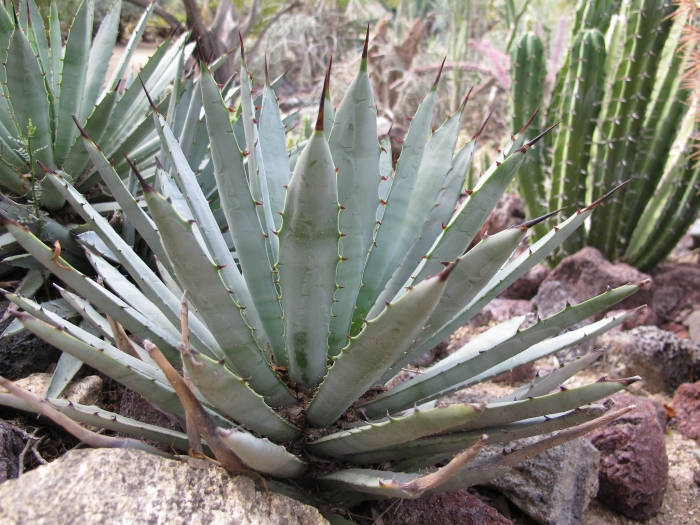Black-Spined Agave
(Agave macroacantha)
Black-Spined Agave (Agave macroacantha)
/
/

Megan Hansen
CC BY-SA 2.0
Image By:
Megan Hansen
Recorded By:
Copyright:
CC BY-SA 2.0
Copyright Notice:
Photo by: Megan Hansen | License Type: CC BY-SA 2.0 | License URL: https://creativecommons.org/licenses/by-sa/2.0/ | Uploader: MeganEHansen | Publisher: Flickr |













Estimated Native Range
Summary
Agave macroacantha, commonly known as Black-Spined Agave, is an evergreen succulent native to the arid and semi-arid regions of Central and Southwestern Mexico, where it thrives in rocky outcrops and desert landscapes. This plant typically grows to a height of 0.5 to 1 meter (1.6 to 3.3 feet) and a similar width, forming rosettes of thick, fleshy leaves that are blue-green with distinctive black spines at the tips and margins. The flowers, which appear infrequently and only after several years, are small, grey, and red, and emerge on sturdy, branched stems that can reach up to 3 meters (10 feet) in height. The flowering event is quite showy and attracts pollinators such as bats and moths.
Black-Spined Agave is valued for its architectural form and striking leaf coloration, making it a popular choice for rock gardens, xeriscaping, and as a focal point in drought-tolerant landscapes. It is also suitable for container cultivation, which allows for overwintering in cooler climates. This agave is relatively low-maintenance, requiring minimal watering and thriving in well-draining, gravelly or sandy soil. It is tolerant of full sun and high temperatures, reflecting its desert origins. While it is generally pest-resistant, overwatering can lead to root rot. The Royal Horticultural Society’s Award of Garden Merit highlights its ornamental qualities and performance in cultivation. Gardeners should handle with care due to the sharp spines, and it is advisable to plant away from foot traffic.CC BY-SA 4.0
Black-Spined Agave is valued for its architectural form and striking leaf coloration, making it a popular choice for rock gardens, xeriscaping, and as a focal point in drought-tolerant landscapes. It is also suitable for container cultivation, which allows for overwintering in cooler climates. This agave is relatively low-maintenance, requiring minimal watering and thriving in well-draining, gravelly or sandy soil. It is tolerant of full sun and high temperatures, reflecting its desert origins. While it is generally pest-resistant, overwatering can lead to root rot. The Royal Horticultural Society’s Award of Garden Merit highlights its ornamental qualities and performance in cultivation. Gardeners should handle with care due to the sharp spines, and it is advisable to plant away from foot traffic.CC BY-SA 4.0
Plant Description
- Plant Type: Succulent
- Height: 1-2 feet
- Width: 3-4 feet
- Growth Rate: Slow
- Flower Color: Green, Purple
- Flowering Season: Spring, Summer
- Leaf Retention: Evergreen
Growth Requirements
- Sun: Full Sun
- Water: Very Low, Low
- Drainage: Medium, Fast
Common Uses
Bee Garden, Bird Garden, Drought Tolerant, Fire Resistant, Hummingbird Garden, Low Maintenance, Rabbit Resistant, Rock Garden, Street Planting
Natural Habitat
Native to arid and semi-arid regions, rocky outcrops, and desert landscapes in Central and Southwestern Mexico
Other Names
Common Names: Large-Thorned Agave
Scientific Names: , Agave macroacantha, Agave besseriana, Agave concinna, Agave flavescens, Agave flavescens var. macroacantha, Agave integrifolia, Agave linearis, Agave macroacantha var. integrifolia, Agave oligophylla
GBIF Accepted Name: Agave macroacantha Zucc.